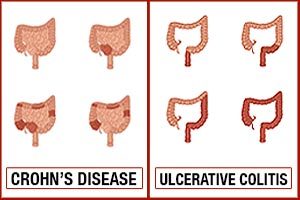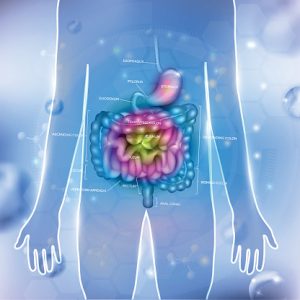The first week of December is Crohn’s and Ulcerative Colitis Awareness Week, a time when we all come to together to spread information and those affected share their personal experiences living with the inflammatory bowel disease. We at Bel Marra want to do our fair share of spreading the word, so we have compiled a list of our most informative articles on the subject.
You will find information on infectious colitis, ulcerative colitis complications, as well as what the differences are between Crohn’s vs colitis. We have also included an interesting piece on how Crohn’s disease and ulcerative colitis relapse may be triggered by sleep disturbances.
Crohn’s disease vs. ulcerative colitis, differences in symptoms, causes, and treatment
Advertisement
 Crohn’s disease and ulcerative colitis are part of the group of conditions known as inflammatory bowel diseases (IBD). Prior to the 20th century, before the rise of hygiene and urbanization, inflammatory bowel disease was quite rare. Currently, IBD is found in developed countries and is believed to be caused by a lack of germ resistance development – although the exact cause is still unknown.
Crohn’s disease and ulcerative colitis are part of the group of conditions known as inflammatory bowel diseases (IBD). Prior to the 20th century, before the rise of hygiene and urbanization, inflammatory bowel disease was quite rare. Currently, IBD is found in developed countries and is believed to be caused by a lack of germ resistance development – although the exact cause is still unknown.
For those living with IBD, their immune system mistakes food and bacteria in the gastrointestinal tract for an allergen or foreign substance, so it sends out cells to destroy it. The result of these attacks is chronic inflammation. Continue reading…
Genes behind Crohn’s disease and ulcerative colitis uncovered
 Crohn’s disease and ulcerative colitis are types of inflammatory bowel disease (IBD). Research on IBDs continues as doctors learn more and more about these conditions, which affect the digestive system. Patients with IBD often have to change their diets and suffer from symptoms of abdominal pain, cramping, diarrhea, rectal bleeding, and extreme fatigue. Furthermore, these diseases can increase the risk of complications such as fissures or colon cancer. As inflammation takes over the intestines, colon symptoms worsen and a person’s quality of life is negatively affected. Continue reading…
Crohn’s disease and ulcerative colitis are types of inflammatory bowel disease (IBD). Research on IBDs continues as doctors learn more and more about these conditions, which affect the digestive system. Patients with IBD often have to change their diets and suffer from symptoms of abdominal pain, cramping, diarrhea, rectal bleeding, and extreme fatigue. Furthermore, these diseases can increase the risk of complications such as fissures or colon cancer. As inflammation takes over the intestines, colon symptoms worsen and a person’s quality of life is negatively affected. Continue reading…
Infectious colitis: Causes, symptoms, and treatment tips
 The term infectious colitis sounds awful, and it can be. Infectious colitis is inflammation of the main part of the large intestine (colon) and can lead to sudden lower abdominal pain. In some cases, the pain can be severe.
The term infectious colitis sounds awful, and it can be. Infectious colitis is inflammation of the main part of the large intestine (colon) and can lead to sudden lower abdominal pain. In some cases, the pain can be severe.
While inflammation is a common medical term and may not seem all that serious, the reality is that when left untreated, it can lead to complications and has the potential to be deadly. Continue reading…
Crohn’s disease and ulcerative colitis relapse may be triggered by sleep disturbances
 Many people understand the importance of a getting a good night’s sleep, but recent research indicates that two inflammatory bowel diseases, Crohn’s disease and ulcerative colitis could relapse due to sleep disturbances.
Many people understand the importance of a getting a good night’s sleep, but recent research indicates that two inflammatory bowel diseases, Crohn’s disease and ulcerative colitis could relapse due to sleep disturbances.
Advertisement
Sleep disturbances are associated with absenteeism at work, as well as an increased need for healthcare services. Research shows that it is also closely linked to gastrointestinal (GI) symptoms. These problems could include hypertension or impairment of glucose control, and increased inflammation. While getting back into a normal sleep pattern can often resolve health issues, science tells us that it is different with IBD and sleep. With IBD or inflammatory bowel disease, such as Crohn’s disease and ulcerative colitis, symptoms often worsen when there are sleep disturbances. Continue reading…
Ulcerative colitis complications: Arthritis, uveitis, osteoporosis, and colon cancer
 Ulcerative colitis is a form of inflammatory bowel disease (IBD). If not well managed, it can lead to complications, including arthritis, uveitis, osteoporosis, and colon cancer. Ulcerative colitis causes inflammation of the large intestine, although the exact reason why this happens is still unknown.
Ulcerative colitis is a form of inflammatory bowel disease (IBD). If not well managed, it can lead to complications, including arthritis, uveitis, osteoporosis, and colon cancer. Ulcerative colitis causes inflammation of the large intestine, although the exact reason why this happens is still unknown.
Symptoms of ulcerative colitis include rectal bleeding, abdominal pain, and diarrhea. It is well known that ulcerative colitis can increase one’s risk for colon cancer, but there is a number of other health complications associated with this condition. Continue reading…
